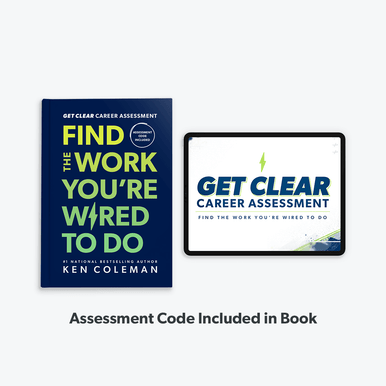
Every one of us has been blessed with God-given talents—and yes, that includes you. You don’t have to take my word for it either because the world’s bestselling book clearly spells it out. Yep, I’m talking about the Bible. Romans 12:6 (NLT) says, “In his grace, God has given us different gifts for doing certain things well.” That’s a promise you can take to the bank!
But even though we know we’ve been blessed with certain God-given talents, using them can still feel like a challenge. I talk to folks every day on The Ken Coleman Show who are having a hard time putting their gifts to use—or even figuring out what their talents are in the first place.
If you’re struggling in either of those departments, take a deep breath. I’m going to share some of my favorite tips for using your God-given talents and figuring out what they are in the first place.
How to Use Your God-Given Talents
There are two main ways to use your God-given talents: You can use them at work, and you can use them to serve others outside of work.
Using Your God-Given Talents at Work
The world needs you. You were created with unique gifts and talents, and the world needs you to use them. You were also created to fill a unique role, and the world needs you to do that too.
Get expert money advice to reach your money goals faster!
We just looked at Romans 12:6, which promised us that everyone has God-given talents. Well, the very next verse takes things a step further by telling us that using our God-given talents isn’t an option—we need to use them.
That’s some very clear direction, my friends. It’s why working in a job that lets you use your God-given talents is essential.
After all, we spend most of our lives at work, and we’re completely wasting our talents if we don’t spend any of that time using them.
I feel bad for all the people who settle for a J-O-B they can’t stand just to collect a paycheck at the end of the month. Hear me on this: Work does not have to be like that.
You absolutely can work in a job that lets you use your God-given talents every single day. In fact, not only can you do that—you should. You have a responsibility to use the unique talents you’ve been blessed with. Don’t keep them locked up inside!
So, if you’re not currently working in a job where you get to use your biggest talents, it’s time to start thinking about making a career change.
If you’re not sure where to start as you look for a new career or if you want some clearer direction, pick up a copy of my book The Proximity Principle. In the book, I’ll teach you my proven strategy for getting started and growing in a career that lets you do work you love and use your God-given talents.
Using Your God-Given Talents to Serve Others
In addition to using our God-given talents in our jobs, we need to use the things we do well to bless those around us. As the Bible reminds us in 1 Peter 4:10 (NIV), “Each of you should use whatever gift you have received to serve others.”
Something we say a lot around the office at Ramsey is that giving is the most fun you’ll ever have with money. Well, I’m here to tell you that the same is true for when you give of your talents—and there are a ton of ways you can do that.
For example, if your God-given talents are instruction and leadership, you could use those gifts to serve by volunteering as a Financial Peace University coordinator and pouring into others as they try to take control of their money and transform their lives.
Or if you’re gifted at connecting with and encouraging others, spending time mentoring kids and teens at your church or a local youth center would be a great way to serve.
And you want to know something crazy? Your service to others doesn’t have to happen just when you’re off the clock.
That’s right—it’s possible to work in a job that lets you use your talents to do work you’re passionate about while also achieving results that help others and matter deeply to you (I call those kinds of results your mission).
When those three things line up—your biggest talents, passions and mission—you get to live on purpose and do work you love. That’s your professional sweet spot.
How to Identify Your God-Given Talents
Of course, before you can put your God-given talents to use, you’ve got to identify what they are. And getting clear on your talents is easier than you think!
Questions to Identify Your God-Given Talents
The best way to identify your God-given talents is to spend time thinking about what you do well. Here are some great questions to ask yourself that will lead you in the right direction:
- What’s a task or role that comes easily to me?
- What am I good at?
- Where did I excel in school?
- What’s something I don’t have to work to be good at because I just am good at it?
- What do my coworkers compliment me on most often?
- If someone asked my friends what I do really well, what would they say?
- What do I bring to a team?
- What are my biggest character strengths?
Write down the answers to those questions (I suggest using a good old-fashioned pencil and sheet of paper), then consider what the answers say about you and your talents. When you do that, you should start to get a pretty good idea of what talents you’ve been blessed with.
You can also take my Get Clear Career Assessment, which will give you a custom report that clarifies and verifies your top talents while helping you identify the work you were born to do.
Traps to Avoid When Identifying Your God-Given Talents
For the questions above to work, there are some traps you need to avoid.
One of them is trying to sound too good when you answer the questions. We’re not looking for Shakespeare-quality stuff here, so don’t be afraid to write something down even if you don’t think it sounds poetic or professional enough. Just answer the questions honestly. You can polish later.
Another trap to avoid is getting too specific about what your talents are. If you think one of your special talents is describing cologne scents to other people who are interested in purchasing cologne for themselves, you’re off the mark. That’s way too specific, and it puts you in too small of a box.
Chances are, though, if you’re good at describing scents, you’re a good communicator in general—and that’s a talent. Now you have a lot more career options than a cologne describer would.
There’s one final trap I want to warn you about: thinking too little of yourself.
That’s when you answer one of the questions above honestly but then fear and doubt start to creep in. I know all my friends would say I’m a great listener, but that’s just not true. I spend too much time on myself, and I don’t care about others as much as I should.
Stop.
You’re beating yourself up for no reason, and you’re wrong. If you answered those questions above and identified one of your talents as being a good listener, it’s a pretty safe bet that you are, in fact, a really good listener.
Don’t underestimate yourself and let fear or doubt creep in. Trust the process.
If you are concerned you missed the mark, run your answers by a close friend or two. Ask them, “Do these talents sound like me? Are these actually things I’m good at?” Their feedback should give you a confidence boost.
What Does the Bible Say About Talent?
We’ve already gone over a few Bible verses that talk about using your God-given talents, but that’s not all the Bible has to say about talent. It gives us a few other important teachings, like . . .
- All of our talents—not just some of them—come from God. James 1:17 (NKJV) says, “Every good gift and every perfect gift is from above, and comes down from the Father of lights, with whom there is no variation or shadow of turning.”
- God is intentional with the talents He gives us. That’s what Psalm 139:14 (NKJV) tells us: “I will praise You, for I am fearfully and wonderfully made.”
- No one’s talents are better or more important than anyone else’s. As 1 Corinthians 12:18–19 (NKJV) teaches us: “God has set the members, each one of them, in the body just as He pleased. And if they were all one member, where would the body be?”
All the Bible verses about talent we’ve looked at point to one conclusion: The world needs you and what you have to offer.
It’s time to put your God-given talents to use. But first, you have to figure out what they are. That’s what my book From Paycheck to Purpose is all about, and reading it will help you develop a plan to find work that gives you both a great income and a big impact.



